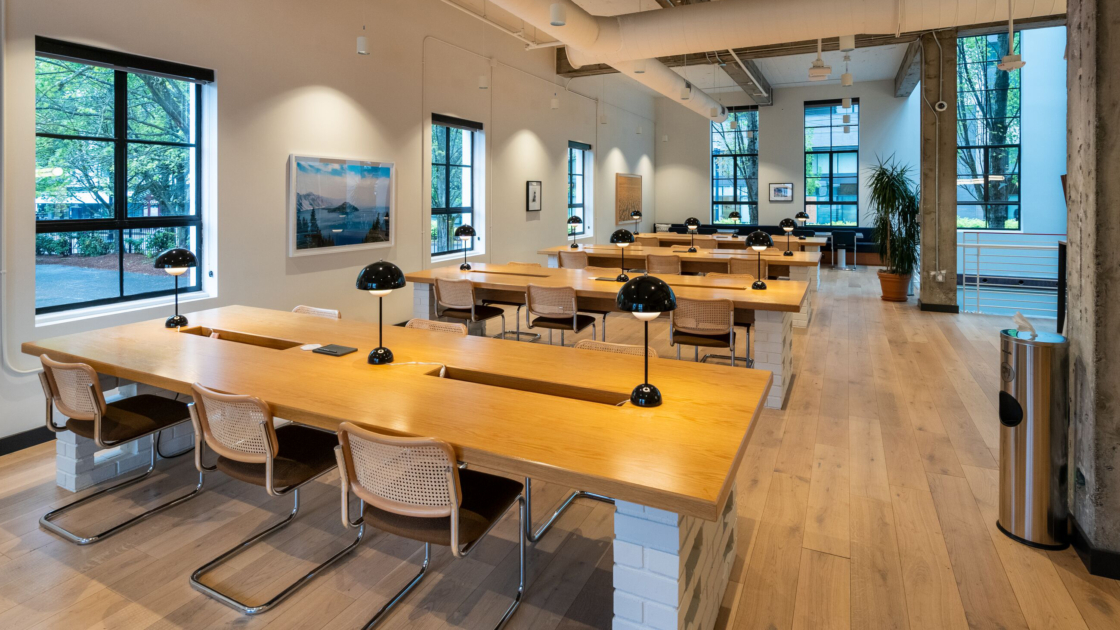There are many fond memories shared between childhood friends. But what happens when a brilliant business idea comes out of a casual movie night? Next thing you know, you might be launching a company with the same person you shared crayons with in the first grade.
Starting a business with a friend can seem like an ideal situation: You’ve already earned each other’s trust and know each other’s strengths and weaknesses. Yet if the business hits troubled waters, things can get a little messy—and may start to feel personal. Steven Papadakis and Peter Abreo, two members of the WeWork community, know this story very well. Each of them launched businesses with childhood friends—and today, their friendships and companies are thriving. Here are their tips to keep both your business and your friendship strong.
Agree on a vision
A clear vision is essential for any business, but this is particularly true when you’re starting a business with a friend. Getting on the same page in terms of your goals, mission, and long-term business plan ensures that you and your friend are working together toward the same outcome. “The vision becomes the force that drives you to get things done,” says Papadakis, a member at WeWork 3537 36th St in Queens, who launched Nyath Group—an umbrella company that encompasses electrical contracting and real estate—with his childhood friend Michael Gatzonis. Both founders had the same vision: an ambition to create generational wealth for their families through real estate.
Build on existing trust
“The best part about building a business with a friend is knowing that you can trust and rely on the person you’re hustling with 24-7,” Papadakis says, who’s known Gatzonis since eighth grade. It’s important to use that trust to your advantage and keep the same mentality in business. “Michael (Gatzonis) is very ‘go, go, go, and we’ll figure it out later.’ I’m more analytical with my approach,” Papadakis says. Because their company is founded on a long history of friendship and a strong basis of trust, these differences are more advantageous than disadvantageous. Papadakis and Gatzonis know when one approach works better than the other in certain situations.
Find someone who challenges you
Peter Abreo, a member at WeWork Galaxy in Bengaluru, India, got lucky when he ran into an old friend in the WeWork Galaxy kitchen who he hadn’t seen in 25 years. “Gerard has a big-thinking approach, so he inspired me and drove me to conceive of Bespotted,” Abreo says of childhood friend Gerard Rego.
Shortly after they reconnected, Abreo launched Bespotted, a platform that allows freelancers to list and benchmark their skills, along with another childhood friend. “[Rego] challenged me to disrupt the business models of a few technology platforms,” Abreo says.
Bring in fresh perspectives
If you initially met your business partner at a young age, you may come from similar backgrounds. For example, Abreo and Rego went to the same church growing up, and Papadakis and Gatzonis went to middle school together. Therefore, it is important to bring in new perspectives from people who can help identify blind spots that founders from similar backgrounds may miss. Papadakis and Gatzonis started their company in 2018 and quickly built out their team. “We originally started with a hot desk in 2017,” Papadakis says. “Eighteen months later, we have two offices and 11 full-time employees.” In the past two years, they’ve hired electricians, real estate buyers, field managers, and other employees who have allowed them to take on larger, more profitable projects. Without the expertise of these employees, the business wouldn’t have been able to grow at its current rate.
Carve out some friend time
When you work together all day, it’s easy for a casual dinner to turn into a business one. But setting aside time to focus solely on your friendship can help your relationship stay strong—which, in turn, benefits the business. If you’re spending quality time together, try to leave your laptops behind and silence your phones to tune out work-related distractions.
Communicate often, with everyone
Despite your best efforts, the boundaries between work time and friend time will be crossed at some point. When that happens, be sure to share any of the great ideas that are generated with the rest of the team. It’s important that all of your employees feel included and supported, even if they’re not coming to brunch with you on Sunday morning.
Write down your plans
Writing everything down is a best practice for any entrepreneur starting a business, but it is a nonnegotiable when going into business with a friend. While it may feel unnecessary or a little uncomfortable at the time, documenting a business plan, an exit plan, and the what-if scenarios can help you navigate any murky waters without hard feelings—ultimately preserving your friendship in the long run. “Though we haven’t faced too many challenges as of yet, the hardest part of running a business with a friend is deciding how to continue our friendship irrespective of the business outcomes,” Abreo says.
Express your appreciation
Showing gratitude to someone helps bolster a strong bond between two people in business, particularly those who have a relationship they’d like to preserve outside the business. Telling your business partner that they nailed that investor pitch can go a long way in establishing empathy and trust. Abreo’s best advice: “Build trust, be transparent, and genuinely believe in each other’s skills and capabilities.”
If there’s one thing that Abreo and Papadakis have both learned, it’s never pass up an opportunity to catch up with an old friend or engage with a new one. You never know when it could change the trajectory of your life. “Bumping into a childhood friend in the kitchen would seem normal to most,” Abreo says in his blog post on Medium, “unless you’re able to look back a year down the line to figure out that it had completely altered your career path.”
Jenna Wilson is a senior associate on the social media team at WeWork and a writer for Ideas by We. She writes about impact, sustainability, and WeWork’s employees around the world.







